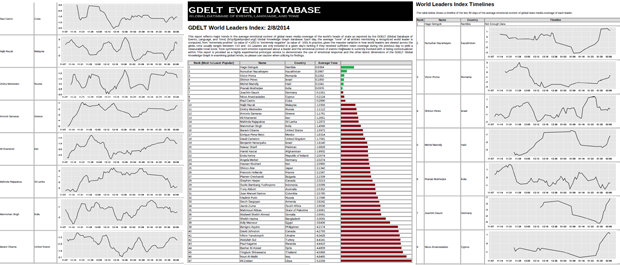
UPDATE 2/6/2016: We are still publishing these files daily, but the list of world leaders is not currently being updated while we transition to our new system. You can still download them in the format (YYYY-MM-DD.pdf), they are generated each morning with the date of the prior day. For example, on 2/6/2016 the latest report would be found at the URL http://data.gdeltproject.org/worldleadersindex/GDELT_Leaders_Index-2016-02-05.pdf
Building on the phenomenal success of the GDELT Global Daily Trend Reports, we are incredibly excited to share with you our latest creation, the new GDELT World Leaders Index, which ranks the world’s heads of state each morning according to the average tone of all monitored global news coverage mentioning them in the previous 48 hours. In essence, we create a popularity index that ranks world leaders from most to least popular and how their popularity is changing over time.
Using Wikipedia’s list of current heads of state, the CIA Chiefs of State series, and other sources, a list was compiled of the major accepted spellings and transliterations of the world’s recognized heads of state. Each morning this list is compared with the list of person names identified by the GDELT Global Knowledge Graph from the world’s media during the previous 48 hours and the average "tone" of all articles mentioning each leader is computed, from "extremely positive" (a value of +100) to "extremely negative" (a value of -100). In practice, given the massive variation in how world leaders are viewed across the globe, tone usually ranges between +10 and -10. Leaders are only included in a given day's ranking if they received sufficient news coverage during the previous two days to yield a measurable tonal score.
The table on the first page of the daily index ranks each leader by the average tone of articles discussing that leader during the previous 48 hours. The remainder of the report offers a timeline for each leader showing how tone towards him or her has varied over the previous 90 days, which helps contextualize whether that leader is increasing or decreasing in media popularity. To smooth the day-to-day noise to reveal long-term trends, the timelines use a 7-day rolling window smoothing function.
Tone synthesizes both emotion expressed about a leader and the emotional context of events the leader is currently involved with or being contextualized within. News coverage of major events tends to mention a head of state by name only when that leader is directly involved in the event, is directly affected by the event, or issues a formal statement or otherwise takes action or is connected to the event. Thus, a head of state which orders the police to violently disperse protesters will be contextualized in the massively negative tone associated with that violence. In a similar vein, if the world condemns a leader who fails to take action to stem violent unrest, that leader would similarly be associated with the resulting strongly negative tone. Leaders can also become contextualized in negative tone for events involving or affecting them. A series of disclosures that a foreign head of state’s highly secret cellular communications were tapped would likely yield strongly negative tone surrounding that leader, depending on the level of outrage or dismissiveness expressed in the media. On the other hand, a massive natural disaster which wreaks significant destruction, but during which a head of state is viewed as taking charge and rapidly addressing the damage and helping the affected citizenry will likely result in a positive tone towards that leader. Keep in mind that emotional response data derived from news media coverage is far more nuanced than traditional polling data and requires considerable more nuance to interpret. One of our hopes with this new service is that it demonstrates new applications for the emotional and latent dimensions provided by the GDELT Global Knowledge Graph. For example, one could swap out the list of world leaders for a list of domestic political leaders within a country to create detailed rankings of all of the major politicians within a particular country.
You can access the archive of reports, starting February 8, 2014 on the GDELT website, or subscribe to the Google Groups mailing list we set up for the Global Daily Trend Reports to get the PDF report in your inbox each morning (the daily email now includes both the conflict trend report and the world leaders index):
https://groups.google.com/forum/#!forum/gdelt-daily-global-trend-report—material-conflict